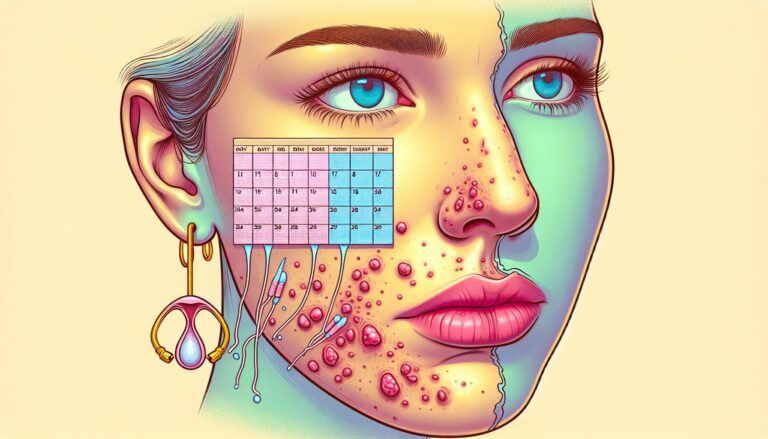Does Accutane Cause Weight Gain?
Wondering if Accutane could lead to weight gain?
It’s a concern for many embarking on their acne treatment journey with this potent medication. Accutane, known for its effectiveness in battling severe acne, does come with a suite of potential side effects, but is weight gain one of them?
Well, we’ll be going over:
- What Accutane is and how it functions in treating severe acne.
- A closer examination of the common side effects associated with Accutane, with a focus on its relationship with weight changes.
- Practical advice on managing your overall well-being while undergoing Accutane treatment.
Let’s delve in.

What is Accutane?
Accutane, clinically known as Isotretinoin, is a form of vitamin A used to treat severe nodular acne. This medication is often prescribed when other treatments fail to bring results. It works by reducing the production of facial oil (sebum) that can lead to severe acne.
Understanding how Accutane works is key to grasping its potential effects on your body. By decreasing sebum production, Accutane helps prevent the development of acne. However, its potency necessitates a thorough understanding of possible side effects, including the ongoing debate regarding weight gain.
It’s crucial to consult with a dermatologist to assess if Accutane is the right fit for your acne treatment plan. They’ll consider your medical history, the severity of your acne, and weigh the benefits and possible side effects.
Understanding Severe Acne
Severe acne isn’t just a cosmetic issue; it’s a medical condition that can significantly affect your skin health and emotional well-being. When your pores clog with dead skin cells, oil, and bacteria, it can lead to inflammation and result in persistent, painful acne.
Severe acne is characterized by deep, painful cysts and nodules which can lead to scarring if not properly treated.
The key to managing severe acne lies in understanding its root causes which include hormonal imbalances, genetics, and lifestyle factors. Over-the-counter treatments might not be effective for severe acne, highlighting the importance of seeking professional advice.
A dermatologist can offer treatment plans that address the specific needs of your skin.
In exploring treatment options, it’s essential to consider the potential side effects and effectiveness of each. Accutane, for instance, is a powerful medication known for its ability to significantly reduce severe acne where other treatments have failed.
However, it comes with a list of possible side effects, making it vital to weigh its benefits against potential risks with your dermatologist.
Exploring Accutane’s Side Effects
When stepping into the world of acne treatments, particularly Accutane, it’s crucial to arm yourself with knowledge. Accutane is a potent medication that offers hope to those battling severe acne when other treatments have failed.
However, like all powerful solutions, it comes with its fair share of side effects. Understanding these can guide you in making an informed decision about your acne treatment plan.
Amongst its side effects, Accutane has not been directly linked to weight gain. Contrary to some beliefs, the primary concerns with Accutane involve its impact on mood, liver health, and potential birth defects if taken during pregnancy.
Skin dryness and increased susceptibility to UV rays are also notable side effects. Weight changes are not commonly reported or directly associated with its use.
Before starting Accutane, discussing all possible side effects and concerns with your dermatologist is vital. They’ll provide a comprehensive understanding tailored to your health profile, ensuring that you’re prepared for what’s ahead in your acne treatment journey.
Does Accutane Cause Weight Gain?
When diving into the complex world of acne treatments, Accutane often surfaces as a topic of interest for its effectiveness against severe acne.
However, misconceptions about its side effects, particularly regarding weight gain, persist. You might find yourself asking, “Does Accutane cause weight gain?” Let’s clear the air.
Accutane, scientifically known as isotretinoin, is not directly linked to weight gain. Studies and patient experiences reveal that this powerful medication’s primary effects target the skin’s oil glands and not the body’s weight regulation mechanisms.
While every individual’s body reacts differently to medication, the prevailing evidence does not support the idea that Accutane leads to increased body weight.
Instead of focusing solely on weight, it’s vital to consider the broader spectrum of Accutane’s potential side effects. These include alterations in mood, liver health considerations, and the imperative to avoid pregnancy during treatment due to the risk of birth defects.
Your dermatologist will provide a comprehensive overview to ensure you’re making an informed decision tailored to your health and skincare needs.
Accutane and Weight Gain
Accutane, known scientifically as isotretinoin, works by targeting the sebaceous glands in your skin, reducing oil production.
Unlike many medications that can affect your metabolic rate or appetite, Accutane does not directly influence your body’s weight mechanisms. Understanding this distinction is crucial when considering the medication’s side effects.
Research into Accutane and its link to weight changes is sparse, making it challenging to draw a definitive conclusion. However, the prevailing evidence suggests that weight gain is not a direct side effect of Accutane.
Instead, any changes in weight may be attributed to other factors, such as shifts in diet, exercise habits, or emotional well-being during treatment.
When discussing Accutane with your dermatologist, it’s essential to explore all potential side effects and how they might impact you. Although weight gain might not be a primary concern, being informed about how Accutane works will help you make a well-rounded decision about your acne treatment plan.
Managing Potential Weight Changes while on Accutane
While Accutane isn’t directly linked to weight gain, you may experience changes in your body’s composition due to alterations in your lifestyle or emotional well-being during treatment. Being proactive can help you manage these potential changes effectively.
Firstly, maintaining a balanced diet is crucial. Focus on nutrient-rich foods and ensure you’re meeting your body’s caloric needs without overindulging in empty calories. It’s not just about the quantity of food but the quality as well; aim for a diet high in vegetables, fruits, lean proteins, and whole grains.
Staying active plays a vital role too. Incorporate regular physical activity into your routine, whether it’s a daily walk, yoga, or any exercise you enjoy. Physical activity not only helps in maintaining a healthy weight but also boosts your mood and overall well-being.
Lastly, staying hydrated is key. Drinking plenty of water helps in flushing out toxins and may reduce the temptation to snack excessively, aiding in weight management.
While on Accutane, listen to your body and adjust your lifestyle as needed. If you notice significant weight changes, don’t hesitate to discuss them with your dermatologist.
Conclusion
Navigating the journey to clear skin, especially when dealing with severe acne, requires a thoughtful approach and sometimes, the assistance of powerful medications like Accutane. It’s crucial to dispel myths and understand the facts, particularly about Accutane and weight gain.
Armed with the knowledge that Accutane doesn’t directly cause weight changes, you can focus on what truly matters: addressing your skin’s health under the guidance of a trusted dermatologist.
Remember, managing potential side effects is part of the process, and maintaining a healthy lifestyle can support your overall well-being during treatment.
Always keep the lines of communication open with your healthcare provider, ensuring any treatment plan aligns with your individual health needs and skincare goals. Your journey to clearer skin is personal, and understanding the tools available to you is the first step towards achieving the results you desire.






